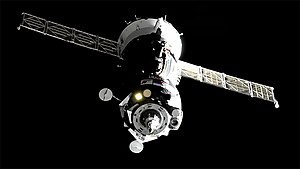Soyuz MS-24
 Soyuz MS-24 approaching the ISS | |
| Names | ISS 70S |
|---|---|
| Mission type | Crewed mission to ISS |
| Operator | Roscosmos |
| COSPAR ID | 2023-143A |
| SATCAT no. | 57862 |
| Website | en |
| Mission duration | 203 days, 15 hours and 33 minutes |
| Spacecraft properties | |
| Spacecraft | Soyuz MS No.755 |
| Spacecraft type | Soyuz MS |
| Manufacturer | RSC Energia |
| Crew | |
| Crew size | 3 |
| Members | Loral O'Hara |
| Launching |
|
| Landing |
|
| Callsign | Antares |
| Start of mission | |
| Launch date | 15 September 2023, 15:44 UTC |
| Rocket | Soyuz-2.1a |
| Launch site | Baikonur Cosmodrome, Site 31 |
| Contractor | Progress Rocket Space Centre |
| End of mission | |
| Landing date | 6 April 2024, 07:17 UTC |
| Landing site | Kazakh Steppe, Kazakhstan |
| Orbital parameters | |
| Reference system | Geocentric orbit |
| Regime | Low Earth orbit |
| Inclination | 51.66° |
| Docking with ISS | |
| Docking port | Rassvet nadir |
| Docking date | 15 September 2023, 18:53 UTC |
| Undocking date | 6 April 2024, 03:54 UTC |
| Time docked | 203 days, 9 hours and 1 minute |
 O'Hara, Kononenko and Chub | |
Soyuz MS-24 was a Russian crewed Soyuz spaceflight launched from Baikonur on 15 September 2023 to the International Space Station.[1]
Crew
They were originally assigned to Soyuz MS-23 mission, but they were moved to MS-24 due to a coolant leak on Soyuz MS-22 that required MS-23 to be launched uncrewed as its replacement. Oleg Kononenko is assigned for a one year long mission with his MS-24 crewmate Nikolai Chub that started on September 15, 2023. If the mission lasts 300-365 days, Kononenko will have spent a total of 1,036-1,101 days in space, exceeding the current record of 878 days by Gennady Padalka. He will thus also become the first person to stay 1,000 days in space.
Primary Crew
| Position | Launching Crew member | Landing Crew member |
|---|---|---|
| Commander |  Oleg Kononenko, Roscosmos Oleg Kononenko, RoscosmosExpedition 69/70/71 Fifth spaceflight |  Oleg Novitsky, Roscosmos Oleg Novitsky, RoscosmosVisiting Fourth spaceflight |
| Flight Engineer/ Spaceflight Participant |  Nikolai Chub, Roscosmos Nikolai Chub, RoscosmosExpedition 69/70/71 First spaceflight |  Marina Vasilevskaya[2] Marina Vasilevskaya[2]Visiting First spaceflight |
| Flight Engineer |  Loral O'Hara, NASA Loral O'Hara, NASAExpedition 69/70 First spaceflight | |
Backup crew
| Position | Crew member | |
|---|---|---|
| Commander |  Aleksey Ovchinin, Roscosmos Aleksey Ovchinin, Roscosmos | |
| Flight Engineer 1 | None | |
| Flight Engineer 2 |  Tracy Caldwell-Dyson[3], NASA Tracy Caldwell-Dyson[3], NASA | |
Undocking and Return
After completing her expedition, Loral returned to Earth on 6 April 2024 with Roscosmos cosmonaut Oleg Novitsky and Belarusian spaceflight participant Marina Vasilevskaya (both on ISS EP-21) on the Soyuz MS-24 spacecraft. On the other hand, Kononenko and Chub will remain aboard the ISS orbital laboratory for about one year and return with NASA astronaut Tracy Caldwell-Dyson on the Soyuz MS-25 spacecraft. If the mission lasts 300–365 days, Kononenko will have spent a total of 1,036–1,101 days in space, exceeding the current record of 878 days by Gennady Padalka. He will thus also become the first person to stay 1,000 days in space.[4]
References
- ^ Zak, Anatoly (13 February 2023). "Space exploration in 2023". RussianSpaceWeb. Retrieved 16 February 2023.
- ^ "Belarusian female astronaut to go ISS in March 2024 — Roscosmos". TASS. Retrieved 30 May 2023.
- ^ Imgur. "imgur.com". Imgur. Retrieved 13 August 2022.
- ^ "Better Late Than Never: New ISS Crew Prepares to Fly, All-Female EVAs Possible in October – AmericaSpace". www.americaspace.com. 10 September 2023. Retrieved 19 September 2023.
- v
- t
- e
(Expedition 71)
| Soyuz MS-24/Soyuz MS-25 | |
|---|---|
| SpaceX Crew-8 |
|
| Soyuz MS-25 |
(Expedition 7)
| Shenzhou 18 |
|
|---|

















